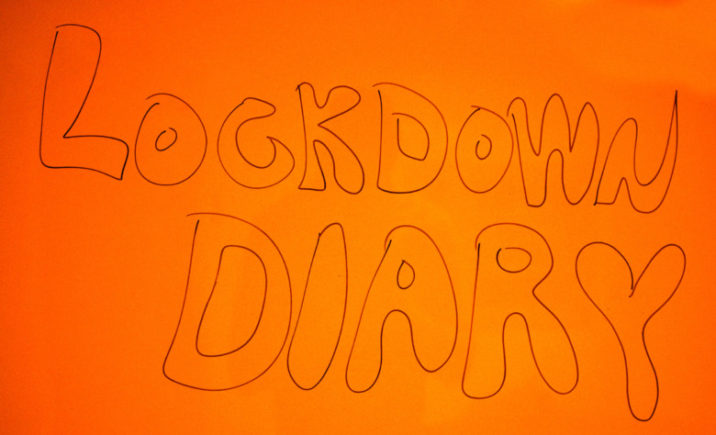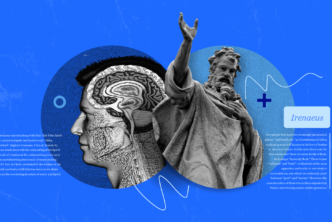You may be stuck at home with a full house, children screaming for toys and food and your spouse vying for his or her own work and study hours. You might be single and more lonely than ever before in your life, wondering what is the point of doing research if nobody is around to share your thoughts and life. Or you might be nearing your retirement wondering how a year of eagerly anticipated research time was snatched away by anxiety and fear.
Take heart. You are not alone. Even some of the most prolific, respected scholars have struggled during this time. Here are their Lockdown Diary entries.
Sean Adams
My lockdown has been hard. At first, it was OK and even a bit nice being around my family. However, the pressures of working, homeschooling, chores, etc. became increasingly stressful.
Things came to a head in June when I contracted stress-induced shingles and my depression worsened. It has been a slow recovery. I am on research leave this semester, so I am trying to get work done, but concentration is low. I am feeling disappointed that I am not achieving what I hoped to as I was looking forward to this leave for a few years.
The lockdown has not been all bad; I have gotten to know my neighbours much better and am working on a more sustainable pace.
Sean A. Adams is Senior Lecturer in New Testament and Ancient Culture at the University of Glasgow.
John M. G. Barclay
Life in lockdown is exhausting. Planning, organising, and administering online teaching is sapping all the mental energy and time at the moment, while teaching is less rewarding than usual, without significant face-to-face interaction. (God so loved the world, that he did not Zoom us …).
Also the drama, frustration and anxiety caused by the news takes up so much mental and emotional space, that it is hard to think clearly and well. The result is that there is, for me at least, very little reading/research and no extended writing taking place at all.
On the plus side, the online world allows international interaction across continents without the hassle, pollution, and expense of travel. But if this goes on long, we will find ourselves with less and less to say to each other, and unable to make meaningful new scholarly relationships. An online conference is not a patch on the real thing!
John M. G. Barclay is the Lightfoot Professor of Divinity at Durham University.
Dr. Dorothea Bertschmann
I am very fortunate that so far we can continue face to face teaching at our small theological College. Seeing real people is a lifeline for me.
I will probably not be able to see my family and friends in Switzerland for a long time, which is hard. I try to focus my mind with good routines and to plan free time and something nice to do.
It is wonderful to be connected in prayer to other people all over the world.
Dorothea Bertschmann is Tutorial Fellow in Biblical Studies and Academic Dean at the College of the Resurrection, Mirfield, UK
Andy Byers
In the first half of my scholarly vocation during the pandemic I was occupied with the rushed development new competencies in learning and teaching technologies. And, of course, there was Zoom: meetings, seminars, tutorials, and more. With four children, there was the managing of both educational and recreational activities.
The latter half of my pandemic experience was vastly different. While my colleagues continued with Zoom and explored hybrid teaching models, I found myself unemployed—I was in a job transition when the lockdown hit, and I could not finalize the move without certain immigration services still off-line due to Covid.
The blessing amidst the uncertainty and lack of income has been extra time for writing and research, and margins for spending more time with family.
Thankfully, the immigration debacle has been sorted. I currently serve as Leech Fellow at St John’s College. In the Autumn I will be taking on the role of Tutor in NT at Ridley Hall, Cambridge University.
My “unpaid research leave” may prove the most productive season in my career.
Andy Byers (PhD, Durham University) is the Leech Fellow, St John’s College, Durham University.
Grace Emmett
This year has been strange for all of us and unnerving in its constant uncertainty. I spent the majority of 2020 writing up my PhD thesis, which I submitted at the beginning of November. The process of writing up certainly did not pan out in the way I imagined with minimal library access and hardly any face-to-face interaction with my colleagues.
Yet for all the challenges that this year brought there is also plenty to be thankful for. Early on, a friend at a different university formed a remote writing group for those of us at a similar stage of our PhD journeys, which was not only incredibly beneficial in terms of receiving feedback on my work but also for providing some structure and scholarly interaction to the seemingly endless days of editing.
Running has always been important to me, but during the first lockdown I seemed to struggle to make time for exercise as the lack of usual boundaries around work allowed it to become somewhat all-consuming. As we entered a second lockdown, I realised that I need to give myself a schedule and goals that didn’t revolve around work to stop it inadvertantly eating up all my time and mental energy.
So this time around I’m aiming to run everyday in lockdown and am being joined virtually by a friend while we both train for a half marathon. Making a choice to run each day reminds me that there are some things that I can still control, including making good decisions for my physical and mental health, even while much of life is being restricted beyond my control at the moment.
As viva-anxiety begins to creep in, it also ensures I take a mental break from work, often enabling me to return to my research with a different perspective.
Grace Emmett, King’s College London
T.J. Lang
Lockdown is hard. If you have struggled to research during this time – struggled to read and write and think interesting things – I am with you. If you have not struggled, very well done, but please be quiet.
At the outset, I thought I’d read novels and write articles, maybe put together a few puzzles and master sourdough. Reality: I went through months when I couldn’t open a book. There’s online teaching. Online everything. Students who need your attention – students struggling with their own severe difficulties. A spouse who works – also online. Three children who need to be taught (also online) – three children also to prevent from destroying the house and killing one another.
To be clear: there was time for reading and research. Plenty, in fact. I just couldn’t do it. War among children might break out at any minute, or even a happy child might burst through the door any second to play Lego – because I work from home in the ‘Lego room’, i.e. the extra bedroom.
This led to months without anything like what we refer to today as ‘scholarly productivity’. I sometimes felt sad. And very often frustrated. I did write some. But I simply did not have the mental space to do the prolonged thinking and reading and writing I love to do.
But there have been some achievements. I am now far more skilled at napping. And I spend much more time in bed. I’m as tired as my Wi-Fi is.
T.J. Lang is Senior Lecturer in New Testament at the University of St Andrews in Scotland.
Julia Lindenlaub
One of the biggest struggles of lockdown has been missing time spent with friends and colleagues, so all of the remarkable effort that has gone into maintaining academic community online has been deeply appreciated.
These efforts have also created unexpected opportunities to connect more with geographically distant colleagues. I still long for the day when we can all share a post-paper pint again, but in the meantime, even the simple things—like keeping in touch via a great Twitter network—make all the difference!
Something that’s been tremendously helpful for me during lockdown is getting lost in fiction. I’ve always been a great fan of epic fantasy and atmospheric ghost stories, so the works of J. R. R. Tolkien and M. R. James have provided freedom of imagination despite feeling stuck at home.
While I usually try to spend valuable reading time on academic work, the disruption in routine is actually proving a welcome (if forced!) excuse to allow myself to read other things. This reminder of how crucial both community and imagination can be for the academic lifestyle is added motivation to invest further in these values moving ahead amidst, and eventually beyond, this challenging situation!
Julia Lindenlaub (PhD, University of Edinburgh)
Ian Paul
When the lockdown first came into force in March, I immediately had a number of speaking engagements and meetings cancelled, which meant spending more time at home. This took the pressure off my time, and I was more relaxed and could spend more time on my hobbies, which felt great.
However, after a few weeks it felt as though life online exploded—there were more events available to attend remotely, and more people seemed to be commenting on social media. It felt as though the virtual walls were closing in, and put me off online engagement.
Since then, I think things have balanced out, not least because we all are more used to doing things online. I have found online teaching this term less stressful, simply because of familiarity and finding ways of better online self-management.
For me, keys to remaining healthy have included being absolutely disciplined about Sabbath—Saturday is an almost non-negotiable day off away from work pressures and with family. Walking the dog is an important daily discipline, and I have also been doing more, regular exercise at home, making use of YouTube fitness videos.
For the last few years I have shifted to starting work early (from 6.30 am to 7 am) and it has been important to accept that the working day therefore finishes earlier as well. And I have decided to feel more relaxed as deadlines pass me by!
I have also settled on a habit of not allowing email transactions to be purely business, but also enquired after correspondents, asking how they are doing. And most weeks I also arrange to catch up with someone for ‘Zoom coffee’, in order to make up for the loss of casual conversation at conversations or around meetings.
All in all, this has together created a good sense of work-life balance.
Dr Ian Paul is Associate Lecturer at St Hild College, and former Academic Dean, St John’s College Nottingham. He is also a writer at www.psephizo.com.
Anthony Royle
As a father of four children between the ages of 6 and 13, it was challenging during the early stages of the lockdown period to engage with my studies as a PhD student as well as assist my children with their learning.
In hindsight, knowing now the uncertainty of the pandemic and future lockdowns, I would have deferred my studies for six months. Yet, by grace and much support from my wife and my parents who now live with us, I have managed to sneak away for short periods of the day and have managed to make some progress with my work including some extra circular projects.
I have also managed to maintain my responsibilities in ministry as well as my part time job in a residential home for adults with learning difficulties with the difficulty of restrictions on human contact.
I don’t think we fully appreciate what a hug does for peoples physical, mental, and spiritual well-being. Unfortunately, a virtual hug is not the same.
Anthony Royle is a PhD Candidate at the University of Glasgow.
Shawn Wilhite
There isn’t one item that the Covid-lockdowns have affected. I tend to think of myself as relatively Type-A and quite structured in my writing and research life. But now, I’m lucky to have a few hours of research, if at all, on any given day.
Earlier in the Covid-lockdown, my days were so blurred that I had trouble discerning a Monday from a Saturday or a Wednesday from a Friday, which prohibited any rest. Deeper into the Covid-lockdowns, the emotional toll began to pile up on itself with the increasing news bites (with CDC information intake), removal of a physical conference and academic gatherings, providing spiritual care for others, watching out for the needs and safety of my family, and tending to the my own health (mental and physical).
We are all in this Covid-season together and in different ways. I want to share some items, related to my experiences, which have somewhat helped during this season, the increased depression, and minimal productivity.
Daily liturgy and ritual provided structure to my days, sleep patterns, and family life—sleep at a regular time, dinner at a reoccurring time, afternoon walks/runs, morning coffee, etc.
Second, processing with a spiritual mentor/director proved helpful in voicing fears, hurts, anxieties, and unmet needs.
Napping has since increased in this season. While I fought it at first, to embrace it has only helped my emotional and physical capacities.
And last, this simply is not a season for productivity but a season to help others and recover. My productivity has flown right out the window. But embracing such a reality has helped me to expect differently from myself and others.
It will be wonderful to spend time with people again, see colleagues, present research, teach in the classroom with students, and begin the research pursuits once more.
Until then, give attention to rest, your health, coffee and a novel in the morning, and slowly find rhythms that work for you.
Shawn Wilhite, California Baptist University





